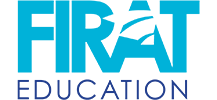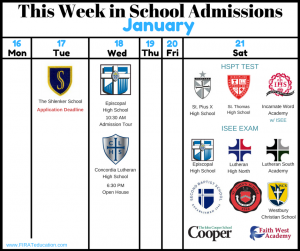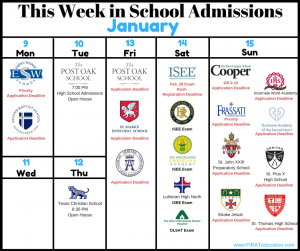Applications for The Shlenker School are due on Tuesday.
Episcopal High School is hosting an Admissions Tour at 10:30 AM on Wednesday. Wednesday evening, Concordia Lutheran High School will hold their Open House at 6:30.
Good luck to everyone taking the HSPT or ISEE at Episcopal High School, Lutheran High North, Lutheran South Academy, Second Baptist School, The John School, Westbury Christian, The John Cooper School, Faith West Academy, St. Pius X High School, St. Thomas High School, and Incarnate Word Academy on Saturday!
Registration for these ISEE exams has closed.
Contact the respective schools for information about registering for the HSPT.
Saturday is the regular registration deadline for the February 11th SSAT exam.
Please post comments here to let us know about your admissions experience!
Applications for The Emery/Weiner School, Second Baptist School, The Post Oak School, St. Mark’s Episcopal School, Veritas Academy, The John Cooper School, Incarnate Word Academy, Frassati Catholic School, Duchesne Academy of the Sacred Heart, St. John XXIII Preparatory School, St. Pius X High School, Strake Jesuit, and St. Thomas High school are due this week.
The Post Oak School is hosting as Open House on Tuesday at 7:00 PM, and Texas Christian High School will host theirs on Thursday at 6:30 PM.
Good luck to everyone taking the ISEE at The Honor Roll School, The Woodlands Christian Academy, Lutheran High North, and the OLSAT at The Awty International School this Saturday!
Registration for these ISEE exams has closed.
For more information about this OLSAT exam, contact The Awty International School Office of Admission at 713-580-0579 or admissions@awty.org.
The rush registration deadline for the January 28th ISEE Exam at Houston Christian High School, Lutheran High North, St. Thomas Episcopal, The Honor Roll School, The Woodlands Christian Academy, and Fort Bend Academy is Saturday January 14th.
Please note: Registration for the ISEE is available up to three weeks before the test for a fee of $105.00. Late registration is available after the three week deadline has passed up to two weeks before the test date for an additional $25.00. If you have questions about whether or not you should take the ISEE more than once, please contact us.
ISEE scores for written exams are available online 7 days after the exam is scored (not exam day). You can receive scores the day they are scored for an addition $40.
Online exam scores are available online as soon as the exam has been scored.
Please post comments here to let us know about your admissions experience!
Through the many open houses I have both hosted and attended, the question often comes up about after school sports for Lower School (elementary) students.
When looking for sports and/or activities for our children we need to keep in mind what we are looking for in a league or organization, and maybe more importantly, what your child wants to do and/or is capable of. When asking schools about sports, we need to keep both of these in mind. What do we want out of this league for our child? Enhanced skills and high levels of competition? Or socialization and having fun?
A simple answer to this is that most elementary or lower school programs will be focused on the latter, socialization and fun. Many schools do not focus on winning and being more competitive until the middle school years, while others do not focus on this until high school. If you are looking for a highly competitive league in the younger grades, the best bet is to look for a competitive league in your area outside of the school teams. Club, travel, and select teams will be much more focused on what you are looking for. The school teams will encourage improvement, but probably not to the level of what the club teams will do.
Below I will break down recommendations for each age group:
Toddlers and young children ages 2 – 5 are still learning gross motor skills; running, throwing, kicking, etc. Additionally, most of the children this age have a very short attention span, and besides the pure desire to “win” struggle to follow the in and outs of the game for its full length. Many children of this age do not fully understand the rules of the game anyway. So, a “lighter” league or even just skill camps may be better for your child. Additionally, there is no evidence that supports starting children at this age in a sport will give them any advantage over their peers that did not play that sport at this young age. However, there are more competitive leagues at this age, but probably will not be a school league.
Children ages 6 – 9 are a wonderful age to start organized sports. Their interest, attention spans, and throwing, running, and kicking abilities improve. However, that being said, it is very easy to put to much pressure on a child at this age, especially if a parent or sibling is very interested in success at sports. Both team and individual competition can teach children many wonderful life skills that will help them as they grow into adults.
Children ages 10 and up, begin to have a much more mature view of sports and the world. They are able to handle much more complex sports and competitions, recalling techniques and strategies when necessary. However, many schools and clubs become much more competitive at this age so playing time and being placed at the correct level for their skills becomes much more of an issue.
So again, it all depends on what you as a parent want for your child and making sure the school or club team matches those expectations. I would not recommend trying to change the school or club teams culture or goals after joining the team. Decide what you want first and then find the right team.
Finally, the most important aspect to keep in mind. Let your child have fun and enjoy the competition, their friends, and life skills they are learning.
(Click on the calendar to enlarge)
This week applications are due for 6th – 12th grade applicants at Awty International School, 5th – 12th grade applicants at St John’s School, and children of church members and siblings of current students at St. Mark’s Episcopal School. Check each school’s respective sites to ensure that you have all the correct submittals completed.
There are tours and open houses at Memorial Lutheran, Episcopal High School, St. Mark’s Episcopal, St. Francis Episcopal School, Strake Jesuit, Texas Christian School, and St. John XXIII College Preparatory.
Good luck to everyone taking the ISEE at The Honor Roll School and Westbury Christian on Saturday!
Registration for these ISEE exams has closed for this exam, but anyone interested in taking the exam on December 3rd at The Honor Roll School or Westbury Christian must do so by Saturday November 19th.
Please note: Registration for the ISEE is available up to three weeks before the test for a fee of $105.00. Late registration is available after the three week deadline has passed up to two weeks before the test date for an additional $25.00. If you have questions about whether or not you should take the ISEE more than once, please contact us.
Please post comments here to let us know about your experience at these open houses!
What do I ask during parent/teacher conferences? The more prepared you are for your parent/teacher conference, the more productive it will be. We’ve put together a list of questions to get you started. Print it out, and bring it with you to take notes.
Print-Ready Parent/Teacher Conference Guide
What do I do after the parent-teacher conferences to follow-up? After the conference, it’s always a good idea to recap your notes in an email to the teacher. Listing areas in need of improvement, steps that will happen at school and at home, and confirm the check-in date. Putting everything in an email to your teacher can ensure a team effort and clear plan moving forward to help your child grow.

Some parents are highly concerned with the curriculum a school uses, while others are not as interested in these details as long as their child is learning what he or she is supposed to learn. Both of these perspectives are fine and most schools do not look upon one viewpoint as being superior to another, especially in the admissions process. If you are not concerned with the details, do not feel you must ask about the details of the curriculum. However, if you are concerned about the curriculum, please reflect on my thoughts below.
Often parents and visitors at school open houses or tours ask about curriculum in a general sense. “What math curriculum do you use?”, or “What kind of curriculum does this school follow?” are questions often heard. However, this seemingly simple question can have a multitude of answers depending on the inquirers’ understanding of the word “curriculum” and the schools’ understanding of the question.
Let me explain…
Curriculum is a term often overused and not well defined. Inside education, curriculum refers to the programs or overall teaching methods used to teach the required grade level objectives. Depending on which state you live in, your child is required to either learn the common core objectives for each grade, or the state objectives (it is up to the state to decide if they want to follow their own or common core objectives– not really the political question that it has become, but that is a topic for another day). So the chosen curriculum, at times is a program purchased by the school or district, or a program is developed by the school themselves. This program is the plan (what they will cover and when they will cover it) to facilitate student growth to attaining those objectives.
With all that being said, if you ask a school what their math curriculum is, and they reply with Envision Math, Everyday Math, or Math in Focus, etc., unless you are highly familiar with different brands of curriculum (or program), those answers would not mean much to you.
As a parent and educator, when I am exploring a school, I am more concerned with the teaching method or overall style of the curriculum or instruction, rather than brand of curriculum. Possible questions to consider asking schools:
- What is the style/method per subjects (will vary between subjects, even at lower grades)?
- Do they follow a project-based or assessment-based model? (as students’ progress in a project based model, they demonstrate their knowledge through projects rather than tests)
- How long have you been using this curriculum?
Here are some questions you can ask yourself:
- Is their philosophy and/or method something I agree with or can get on board with?
- Will I be able to help my child at home if he/she is learning in this method?
- What curriculum am I most comfortable with?
Many schools will not use just one philosophy or style and will supplement the curriculum with valuable pieces from other methods. Either way, understanding these methods and how the school views each subject can be of vital importance to not only selecting the best school for your child, but also encouraging your child’s success.
I’ve included a short list of some of the most common math and reading programs here.
We’ve all heard the benefits of hiring an educational consultant to help place your child into the right fit school. The Independent Educational Consultants Association (IECA) says, “An educational consultant meets personally with families to discuss their unique concerns. To find the right ‘fit’ for your child, IECA consultants learn as much as possible about your student and family. They help you clarify your child’s educational needs, identify strengths and weaknesses, and consider interests and dislikes.” While I agree with this 100%, and it is definitely important when selecting an early childhood, lower school, and middle school, when you decide on a high school, you need to consider another factor: college. Which school meets your requirements for college preparedness?
The last thing you want is to start the college admissions counseling process your sophomore or junior year in high school to realize that maybe you should have selected a different high school, one that would have paved a greater path to meet your college goals. Independent college counselors know this world. We know what it takes during your four years in high school to get into the best fit college.
Then big goal is college. When your child was born, you were already thinking about saving for college, when he or she was bringing home grades in kindergarten through middle school, you thought about college, so when you are making the all-important decision of a high school, hire someone who is also thinking about college along with you.
Ibrahim Firat is an independent educational consultant who specializes in college counseling and high school placement. He is the author of The Firat Guide, a guide to high school admissions in the Greater Houston Area.
We see parents and students struggle with managing the winter break. Some parents want or give too much academic work for their children during the break, while others do not give any thought provoking work. Neither of these approaches are necessary or useful.
I suggest, as with many things in life, we find a healthy balance between the two. Most students, are worked hard enough during the year, so their time off should not be consumed with constant academic work. At the same time, students should not be completely unengaged in critical thinking or problem solving.
Therefore, we should steer away from traditional worksheets, multiple choice style “busy work”. Most students do enough of this during the school year, so they do not need more of this during the break. Rather, the students should spend more time on application or projects, that they may not have time for during the school week.
Depending on the age of the student, parents can do a wide variety of projects with their children that involve creativity, exploration, and/or problem solving. Examples could be:
- Build something together with the child reading the instructions and using appropriate tools for their age (some home improvement stores have age-appropriate “projects” for children to build bird houses, wooden cars, etc. with nails and screws)
- Cook something together, letting the child again read the recipe, measure ingredients, etc. (the child’s favorite meal, treat, or dessert are easy to get them interested in helping with)
- Instead of throwing an old appliance away, take it apart with your child and discover how it works or is put together (small appliances like blenders, dvd players, old computers are wonderful for this – discuss or if need be look up the different parts inside and then try to find them)
- Paint a picture, wall, or object (a new chair for his or her room).
- Plan a road trip and calculate miles and/or how much money is needed for gas, etc. (older children can plan the best route, and help with the budget)
These are just a few ideas, but the point is to keep them engaged, thinking, and active, and limit their time watching tv or playing on electronics. While these may not be considered traditional academic activities, they are all vitally important to children’s cognitive development and often overlooked. Additionally, the value of doing these activities with your child should not be overlooked, as you build a stronger bond and connection through shared experiences.
Winter break is a perfect time for all of this.
(Click on the calendar to enlarge)
This week applications are due for all Pre-K – 1st grade applicants to The John Cooper School and 1st – 4th grade applicants to St. John’s School. Check each school’s respective sites to ensure that you have all the correct submittals completed.
There are tours and open houses at St. Francis Episcopal School, Fusion Academy Houston Galleria, Memorial Lutheran School, The Post Oak School, St. Mark’s Lutheran School, and Presbyterian School.
Good luck to everyone taking the ISEE at Lutheran High North on Saturday!
Registration for these ISEE exams has closed for this exam, but anyone interested in taking the exam on December 3rd at The Honor Roll School or Westbury Christian must do so by Saturday November 19th.
Please note: Registration for the ISEE is available up to three weeks before the test for a fee of $105.00. Late registration is available after the three week deadline has passed up to two weeks before the test date for an additional $25.00. If you have questions about whether or not you should take the ISEE more than once, please contact us.
Please post comments here to let us know how the open houses went for you!
As a parent looking at the vast array of private school options, admission open houses can be a wonderful tool to helping you choose the best fit for your child.
In most large cities, there are many great private schools to choose from. As a parent, most of us will not have the time to thoroughly explore and visit every schooling option available. However, after considering your values and/or working with an educational consultant, hopefully you are able to narrow down your options to three to five schools. From that narrowed down list, is where school visits and admission open houses can help you find the perfect fit. From the minute you step foot on campus you have a feeling about the type of environment that school has built. Through the presentation and tours, hopefully you begin to see the schools values and areas they emphasize (academics, community, athletics, social development, etc.). Of course, during your visit, any specific points of interest to you, certainly ask questions to the admissions staff if those topics have not already been discussed or you would like more information.
After visiting all the finalist schools, consider your personal & family values – then match those to each school’s values. The closer the match, the better the fit for your child and family.
Group admission open houses can be less intimidating. However, individual tours can also address your specific questions. Either way, walking around and visiting the school first hand will give you the best “feeling” for the school and fit for your child.


